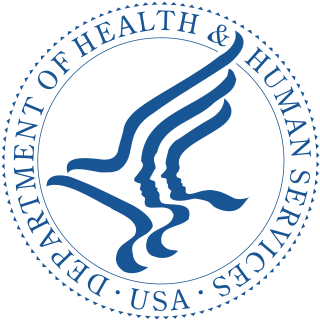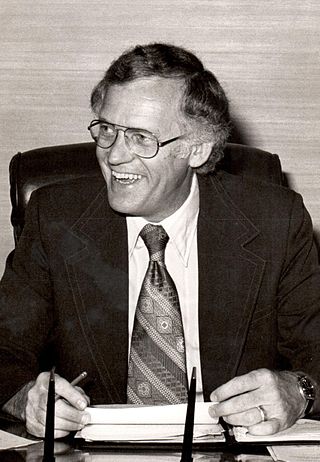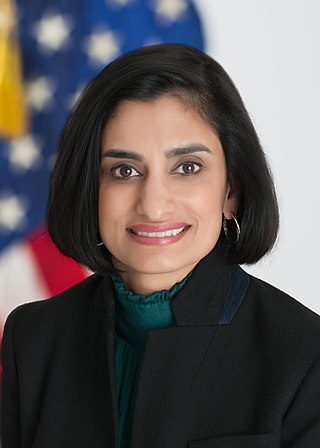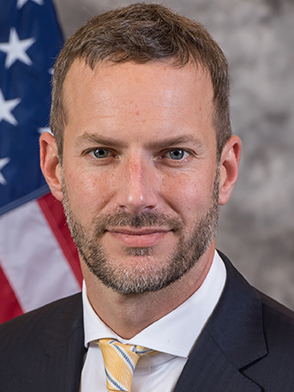
The United States secretary of health and human services is the head of the United States Department of Health and Human Services, and serves as the principal advisor to the president of the United States on all health matters. The secretary is a member of the United States Cabinet. The office was formerly Secretary of Health, Education, and Welfare. In 1980, the Department of Health, Education, and Welfare was renamed the Department of Health and Human Services, and its education functions and Rehabilitation Services Administration were transferred to the new United States Department of Education. Patricia Roberts Harris headed the department before and after it was renamed.

In the United States, Medicaid is a government program that provides health insurance for 85 million individuals with limited income and resources. The program is partially funded and primarily managed by state governments, which also have wide latitude in determining eligibility and benefits, but the federal government sets baseline standards for state Medicaid programs and provides a significant portion of their funding.

Medicare is a government national health insurance program in the United States, begun in 1965 under the Social Security Administration (SSA) and now administered by the Centers for Medicare and Medicaid Services (CMS). It primarily provides health insurance for Americans aged 65 and older, but also for some younger people with disability status as determined by the SSA, including people with end stage renal disease and amyotrophic lateral sclerosis.
Diagnosis-related group (DRG) is a system to classify hospital cases into one of originally 467 groups, with the last group being "Ungroupable". This system of classification was developed as a collaborative project by Robert B Fetter, PhD, of the Yale School of Management, and John D. Thompson, MPH, of the Yale School of Public Health. The system is also referred to as "the DRGs", and its intent was to identify the "products" that a hospital provides. One example of a "product" is an appendectomy. The system was developed in anticipation of convincing Congress to use it for reimbursement, to replace "cost based" reimbursement that had been used up to that point. DRGs are assigned by a "grouper" program based on ICD diagnoses, procedures, age, sex, discharge status, and the presence of complications or comorbidities. DRGs have been used in the US since 1982 to determine how much Medicare pays the hospital for each "product", since patients within each category are clinically similar and are expected to use the same level of hospital resources. DRGs may be further grouped into Major Diagnostic Categories (MDCs). DRGs are also standard practice for establishing reimbursements for other Medicare related reimbursements such as to home healthcare providers.

The Centers for Medicare & Medicaid Services (CMS), is a federal agency within the United States Department of Health and Human Services (HHS) that administers the Medicare program and works in partnership with state governments to administer Medicaid, the Children's Health Insurance Program (CHIP), and health insurance portability standards. In addition to these programs, CMS has other responsibilities, including the administrative simplification standards from the Health Insurance Portability and Accountability Act of 1996 (HIPAA), quality standards in long-term care facilities through its survey and certification process, clinical laboratory quality standards under the Clinical Laboratory Improvement Amendments, and oversight of HealthCare.gov. CMS was previously known as the Health Care Financing Administration (HCFA) until 2001.
Dual-eligible beneficiaries refers to those qualifying for both Medicare and Medicaid benefits. In the United States, approximately 9.2 million people are eligible for "dual" status. Dual-eligibles make up 14% of Medicaid enrollment, yet they are responsible for approximately 36% of Medicaid expenditures. Similarly, duals total 20% of Medicare enrollment, and spend 31% of Medicare dollars. Dual-eligibles are often in poorer health and require more care compared with other Medicare and Medicaid beneficiaries.

The Indian Health Service (IHS) is an operating division (OPDIV) within the U.S. Department of Health and Human Services (HHS). IHS is responsible for providing direct medical and public health services to members of federally recognized Native American Tribes and Alaska Native people. IHS is the principal federal health care provider and health advocate for Indian people.

The Administrator of the National Aeronautics and Space Administration is the highest-ranking official of NASA, the national space agency of the United States. The administrator is NASA's chief decision maker, responsible for providing clarity to the agency's vision and serving as a source of internal leadership within NASA. The office holder also has an important place within United States space policy, and is assisted by a deputy administrator.

Thomas Andrew Scully is an American lawyer and former government official. He was the Administrator of the Centers for Medicare and Medicaid Services (CMS) from 2001 to 2004 under President George W. Bush. Scully is currently a general partner at Welsh, Carson, Anderson & Stowe, a private equity investment firm, where he focuses on health care investments. Scully is also Principal at Federal Health Policy Strategies and a partner at its affiliated law firm Scully, Roskey & Missmar, where he focuses on health care regulatory and legislative matters, as well as on advising clients on health policy and strategies for health care delivery.

Andrew M. Slavitt is an American businessman and healthcare advisor who served as the acting administrator of the Centers for Medicare and Medicaid Services from March 2015 to January 2017 and as a temporary Senior Advisor to the COVID-19 Response Coordinator in the Biden administration. A leader of the team that helped to repair the healthcare.gov website after its initial rollout, he was nominated by Barack Obama to run CMS in July 2015. In January 2021, Slavitt accepted a temporary role as Senior Pandemic Advisor to President Joe Biden’s COVID-19 pandemic response team. He stepped down from that role in June 2021.
An accountable care organization (ACO) is a healthcare organization that ties provider reimbursements to quality metrics and reductions in the cost of care. ACOs in the United States are formed from a group of coordinated health-care practitioners. They use alternative payment models, normally, capitation. The organization is accountable to patients and third-party payers for the quality, appropriateness and efficiency of the health care provided. According to the Centers for Medicare and Medicaid Services, an ACO is "an organization of health care practitioners that agrees to be accountable for the quality, cost, and overall care of Medicare beneficiaries who are enrolled in the traditional fee-for-service program who are assigned to it".
The Center for Medicare and Medicaid Innovation is an organization of the United States government under the Centers for Medicare and Medicaid Services (CMS). It was created by the Patient Protection and Affordable Care Act, the 2010 U.S. health care reform legislation. CMS provides healthcare coverage to more than 100 million Americans through Medicare, Medicaid, the Children’s Health Insurance Program (CHIP), and the Health Insurance Marketplace.

Marilyn Barbour Tavenner is an American government official and health-care executive who served as the Administrator of the Centers for Medicare and Medicaid Services, an agency of the United States Department of Health and Human Services, from 2011 to 2015.

Don I. Wortman (1927-2020) was a U.S. federal government administrator who served 27 years in senior-level executive positions in many federal government agencies. He was Acting Commissioner of the Social Security Administration (SSA) from December 13, 1977 to October 4, 1978. In early 1977, while working at the Department of Health, Education and Welfare (HEW)—precursor to the Department of Health and Human Services—he was Chairman of the task force for implementing the reorganization of HEW. This reorganization included the merging of the Medicare and Medicaid programs into a new agency; this agency was named the Health Care Financing Administration. He became the first Administrator of the Health Care Financing Administration. On two occasions—6 months in 1975 and the first 3 months of 1977—he was Acting Administrator of the Social and Rehabilitation Services, the agency which, at that time, administered the Medicaid program and the Aid to Families with Dependent Children program.

Seema Verma is an American health policy consultant and former administrator of the Centers for Medicare & Medicaid Services in the Donald Trump administration. During her tenure, she was involved in efforts to repeal the Affordable Care Act, as well as reduce Medicaid benefits and increase restrictions on Medicaid. She was embroiled in ethics and legal controversies related to her use of taxpayer money while in office.

Adam Seth Boehler is an American businessman and government official who was unanimously confirmed by the U.S. Senate to serve as the first CEO of the U.S. International Development Finance Corporation. He is currently the CEO of Rubicon Founders, a health care investment firm based in Nashville.
Patrick H. Conway is an American physician and an advocate of health system transformation and innovation in the public and private sector. He is a practicing pediatrician formerly serving at the Cincinnati Children's Hospital and Children's National Medical Center. He was the chief medical officer and acting administrator at the Centers for Medicare and Medicaid Services (CMS) leading quality-of-care efforts for the nation. He also served as the Director of the Center for Medicare and Medicaid Innovation, responsible for new national payment models for Medicare and Medicaid focused on better quality and lower costs.

Chiquita W. Brooks-LaSure is an American healthcare policy official who is the administrator of the Centers for Medicare & Medicaid Services in the Biden administration since May 2021.
Elizabeth Fowler is an American lawyer who is Director of the Center for Medicare and Medicaid Innovation. She previously served under President Barack Obama at the National Economic Council. In 2022, she was included by Stat News on their list of leaders in the life sciences and she was elected a Member of the National Academy of Medicine.











